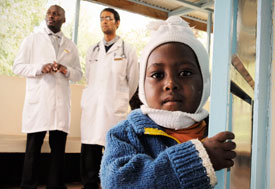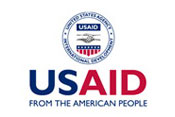USAID, NIH announce global health research collaboration awards
July / August 2013 | Volume 12, Issue 4

Photo courtesy of USAID
USAID and NIH have jointly announced funding for
16 new PEER Health research teams.
To help address some of the world's most pressing health challenges, USAID and NIH have jointly announced funding for
16 new health research teams in 10 countries. The projects are the first to be funded through the
Partnerships for Enhanced Engagement in Research (PEER) Health program, an initiative designed to foster collaborative global research on critical topics. Under PEER Health, USAID will provided nearly $7.5 million to directly support developing country scientists working on research projects in concert with NIH-funded scientists.
Research topics include maternal health and child nutrition, family planning, malaria, tuberculosis, and viral infections. PEER Health awardees were selected from nearly 180 submissions through a competitive peer-review process, conducted by the National Institute of Child Health and Human Development (NICHD).
The new PEER Health awards, made to scientists in countries as geographically diverse as Bangladesh, Cambodia, Indonesia, Mali and Mozambique, will contribute critical scientific knowledge that will improve the lives of mothers and children while also supporting the training of future health practitioners and scientists.
 "The world's health challenges, particularly those related to young children, require the diverse expertise of global research teams," said Dr. Alex Dehgan, USAID's Science and Technology Adviser. "PEER Health brings together the expertise and resources of NIH-funded researchers with the skills and knowledge of developing country researchers - who understand local challenges and opportunities - for scientific collaborations that will reap high rewards on a very human scale."
"The world's health challenges, particularly those related to young children, require the diverse expertise of global research teams," said Dr. Alex Dehgan, USAID's Science and Technology Adviser. "PEER Health brings together the expertise and resources of NIH-funded researchers with the skills and knowledge of developing country researchers - who understand local challenges and opportunities - for scientific collaborations that will reap high rewards on a very human scale."
PEER Health was developed in response to President Obama's
2012 Child Survival Call to Action to end preventable child deaths. NIH has supported research and training in developing countries for decades, but scientists in these countries do not always have the funding to lend their expertise to NIH projects. PEER Heath will allow these country scientists to actively participate in finding solutions to critical areas of global health research.
"By engaging developing country expertise, we hope these scientific partnerships will more efficiently solve the most pressing research questions and identify new approaches and solutions," said Dr. Roger I. Glass, Fogarty director. "Such discoveries will inform development activities aimed at improving maternal and child health."
More Information
To view Adobe PDF files,
download current, free accessible plug-ins from Adobe's website.